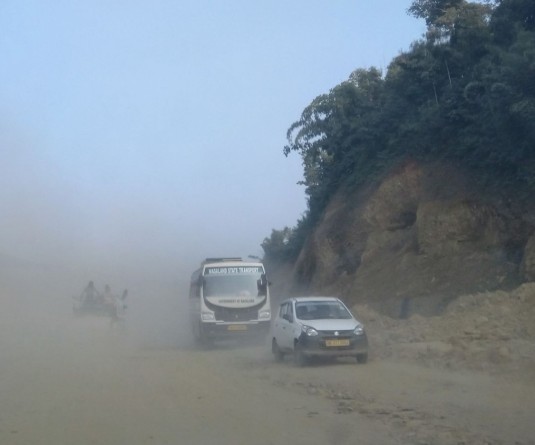
‘We can only pray and hope that the virus does not enter our state,’ say restaurants owners as they veer into uncharted waters
Veroli Zhimo
Dimapur | March 28
It has been a crippling week, the kind I haven't seen all my life, says entrepreneur Medo Putsure, founder of the Bambusa chain of restaurants. Till March 22, his restaurants in Dimapur and Kohima were doing brisk business.
Within a week, the bustling restaurants have turned into haunted outlets. Because of the COVID- 19 scare and government curbs, malls are closed, streets deserted and Medo has closed his restaurants.
Several other restaurants across have downed their shutters; despite being allowed to remain open for takeaway services when the Nagaland government enforced a lockdown from March 22 midnight. The subsequent countrywide lockdown of the central government which came into effect from March 24 midnight also allowed the same.
“We were prepared to provide home delivery services but our delivery partners have closed their services,” says Vioka Zhimomi who manages the Ethnic Table Restaurant and catering service. “We are in uncharted waters. We can only pray and hope that the virus does not enter our state,” he says.
For now, he has to take care of some urgent concerns. One is the high fixed cost that is characteristic of the industry.
For every Rs 100 that the restaurant earns, Vioka says, roughly Rs 30 goes as staff wages, Rs 30 as establishment cost, including rentals, and another Rs 30 is the variable cost of food and beverages consumed while around Rs 10 is the profit margin. Now the restaurant is shut and no revenue is coming in, but he has employees and loans to be paid every month.
Similarly, for Medo who has almost a hundred employees on his payroll, the economic backlash is going to be massive. “In terms of the employees, they are covered for the duration of the lockdown. But in case an extension happens, it’s going to be very difficult for us because the overheads for the restaurant and the business itself are very high,” he says.
“We had to make sure that our employees were provided for and ready for the months lockdown. Hence the first thing we did was distribute advance salary to our ten staff members so they can stock up for the lockdown,” says Tokato, Business Manager of Herbs and Spices restaurant in Dimapur. But for the other fixed costs that are part of running the restaurant (rent, utility bills, etc), we are uncertain how we will hold up in the coming months if the lockdown continues, he adds.
Entrepreneurs seek clear official directives
Food delivery apps like Food Morung and Food Safari have been receiving requests to resume their services. But the proprietors of both the enterprises are hesitant.
“Ideally, we would like to continue, but we also have to consider the welfare of our delivery personnel,” says Asen of Food Morung.
Similarly, Imsu Jamir of Food Safari expressed concern on the safety of the riders, especially since there have been reports of delivery personnel being denied entry into colonies or allegedly being harassed by the agencies enforcing the lockdown.
“If there are proper guidelines and protocols in place, we are open to resuming services,” he adds.
“With no delivery services, we have no option but to shell out the rent, utility bills and employee salaries from the little we saved up to extend the restaurant premises,” said the proprietor of a popular café in Dimapur.
“There are so many mixed messages and the government directives are not clear,” says Medo, adding that he is open to investing in protective gear for employees and ensure sanitization of products.
“If there could be some clear directive and issue of permits or something to that effect, we would be happy to continue services. We don’t have to come to a standstill as long as there is clarity in guidelines and protocol,” he viewed.
The long haul
Atsula, an employee at Ethnic Table, has been receiving worried phone calls from her friend Achi who has been asked to take leave without pay till the lockdown is revoked. Achi works at a small eatery along the City Tower stretch in Dimapur.
While Atsula lives in the quarter provided by her employer, Achi’s biggest worry is how to take care of her family—her elderly mother, and one sister who depends on her for her college fees. “I also have to pay my rent here. I have no money,” she says.
Covid-19 is pushing Nagaland’s already battered economy into the ICU — and entrepreneurs and their employees represent the two ends of the damage the pandemic is inflicting on businesses and the workforce. The horror story is unfolding across sectors. Daily wage workers have been without work for a week and establishments dealing in ‘non essential’ items have grim news.
While the circumstances are completely understandable, there is more to it than just earning money and break even points.
There are so many people, who are dependent on businesses like ours for their livelihood, says Akihito who runs The Garden, Dimapur. While Akihito has paid his six employees for the present month, he is also unsure of the next step if the lockdown is extended.
“This isn’t about one or two weeks. It’s the long haul. Does the government have a bailout plan?” he questioned.






